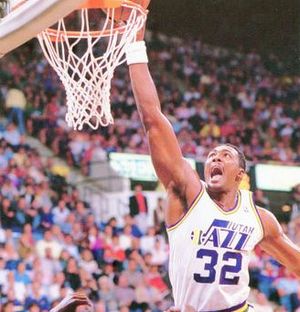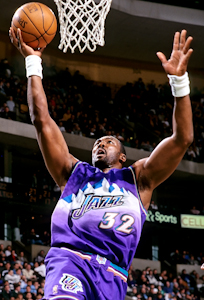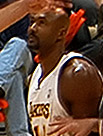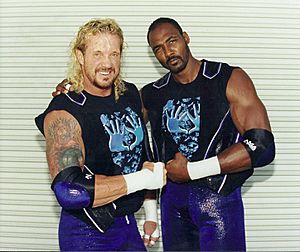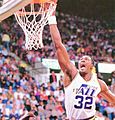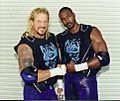Karl Malone facts for kids
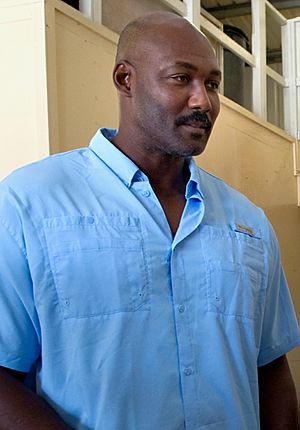
Malone in 2011
|
|||||||||||||||||||||||
| Personal information | |||||||||||||||||||||||
|---|---|---|---|---|---|---|---|---|---|---|---|---|---|---|---|---|---|---|---|---|---|---|---|
| Born | July 24, 1963 Summerfield, Louisiana, U.S. |
||||||||||||||||||||||
| High school | Summerfield (Summerfield, Louisiana) | ||||||||||||||||||||||
| Listed height | 6 ft 9 in (2.06 m) | ||||||||||||||||||||||
| Listed weight | 259 lb (117 kg) | ||||||||||||||||||||||
| Career information | |||||||||||||||||||||||
| College | Louisiana Tech (1982–1985) | ||||||||||||||||||||||
| NBA Draft | 1985 / Round: 1 / Pick: 13th overall | ||||||||||||||||||||||
| Selected by the Utah Jazz | |||||||||||||||||||||||
| Pro career | 1985–2004 | ||||||||||||||||||||||
| Coaching career | 2007–2011 | ||||||||||||||||||||||
| Career history | |||||||||||||||||||||||
| As player: | |||||||||||||||||||||||
| 1985–2003 | Utah Jazz | ||||||||||||||||||||||
| 2003–2004 | Los Angeles Lakers | ||||||||||||||||||||||
| As coach: | |||||||||||||||||||||||
| 2007–2011 | Louisiana Tech (assistant) | ||||||||||||||||||||||
| Career highlights and awards | |||||||||||||||||||||||
|
|||||||||||||||||||||||
| Career NBA statistics | |||||||||||||||||||||||
| Points | 36,928 (25.0 ppg) | ||||||||||||||||||||||
| Rebounds | 14,968 (10.1 rpg) | ||||||||||||||||||||||
| Assists | 5,238 (3.6 apg) | ||||||||||||||||||||||
|
Medals
|
|||||||||||||||||||||||
Karl Anthony Malone (born July 24, 1963) is an American former professional basketball player. He played in the National Basketball Association (NBA). Nicknamed "the Mailman", he is known as one of the greatest power forwards in NBA history. Malone spent 18 seasons (1985–2003) with the Utah Jazz. He formed a powerful team with his teammate John Stockton.
Malone was a two-time NBA Most Valuable Player. He was also a 14-time NBA All-Star. He was named to the All-NBA Team 14 times. This included 11 times in a row on the First Team. His 36,928 career points rank third all-time in NBA history. Only LeBron James and Kareem Abdul-Jabbar scored more. He holds records for most free throws made and attempted. He also started the most regular season games. He is tied for second in first-team All-NBA selections with Kobe Bryant.
Malone played college basketball for the Louisiana Tech Bulldogs. He helped them reach their first NCAA tournament in 1984. They also finished first in the Southland Conference in 1985. The Utah Jazz picked him 13th in the 1985 NBA draft. Malone played in the playoffs every season of his career. This included the NBA Finals in 1997 and 1998 with the Jazz. He played his last season with the Los Angeles Lakers. He reached his third Finals in 2004 with them. Malone also played for the United States men's national basketball team. He won gold medals at the 1992 and 1996 Summer Olympics. In 1996, he was named to the NBA 50th Anniversary Team. In October 2021, he was again honored on the NBA 75th Anniversary Team.
After retiring from the NBA, Malone joined the Louisiana Tech Bulldogs staff in 2007. He was inducted into the Naismith Memorial Basketball Hall of Fame in 2010. He was honored for his individual career and as a member of the 1992 United States men's Olympic basketball team.
Contents
Early Life and College Basketball
Karl Malone was born in Summerfield, Louisiana. He was the youngest of nine children. His mother, Shirley, raised him on a farm. His father passed away when Karl was 14 years old. As a child, Malone often worked on the farm. He chopped trees, hunted, and fished.
He went to Summerfield High School. He led his basketball team to three Louisiana Class C titles. These wins were from 1979 to his senior year in 1981. Malone chose to attend Louisiana Tech University. It was closer to his home. He joined the Louisiana Tech Bulldogs basketball team in his second year. His grades were too low for him to play as a freshman. He played under coach Andy Russo.
In his second season (1983–84), Malone averaged 18.7 points and 9.3 rebounds per game. Louisiana Tech finished the 1984–85 season with a 29–3 record. They were first in the Southland Conference. They made it to the NCAA tournament for the first time. The team reached the Sweet 16 round. Malone was an All-Southland selection in all three of his seasons.
Professional Basketball Career
Utah Jazz (1985–2003)
Starting Years (1985–1987)
The 1985 NBA draft saw the Utah Jazz pick Karl Malone. He was the 13th overall choice. Many thought he should have been picked higher. Malone believed the Dallas Mavericks would pick him. He even rented an apartment in Dallas. But the Mavericks chose Detlef Schrempf instead.
Under coach Frank Layden, Malone averaged 14.9 points and 8.9 rebounds. This was in his first season. He made the 1986 NBA All-Rookie Team. He finished third for Rookie of the Year. On January 14, 1986, the Jazz beat the Houston Rockets 105–102. This ended the Rockets' 20-game home winning streak. Malone scored 29 points in that game.
The Jazz made the playoffs for the third year in a row. But they lost in the first round of the 1986 playoffs. They were defeated by the Dallas Mavericks. Malone improved his scoring in the playoffs. He averaged 20 points per game. After his second season, Malone became the Jazz's top scorer. He averaged 21.7 points and 10.4 rebounds.
Becoming an All-Star (1987–1996)
By the 1987–88 season, Malone was the main player for the Jazz offense. John Stockton was the team's playmaker. Malone made his first All-Star Game in 1988. He averaged 27.1 points per game. He was also named to his first All-NBA team. This was the first of 14 All-Star appearances for Malone. In the 1988 NBA All-Star Game, Malone led the Western Conference team with 22 points.
The Jazz finished with a 47–35 record. They beat the Portland Trail Blazers in the first round. In the next round, the Los Angeles Lakers defeated the Jazz. The Lakers, led by Magic Johnson, won in seven games. Malone scored 31 points and had 15 rebounds in the final game.
Malone signed a 10-year contract in 1988. In December 1988, Jerry Sloan became the new head coach. Malone averaged 29.1 points in 1988–89. This was second in the NBA behind Michael Jordan. He also averaged 10.7 rebounds. At the 1989 NBA All-Star Game, Malone had 28 points and 9 rebounds. He won his first NBA All-Star MVP award. The Jazz finished 51–31. But they lost in the first round of the playoffs. Malone earned his first All-NBA First Team honor this season.
During the 1989–90 season, Malone's scoring increased to 31 points per game. His rebounding went up to 11.1 per game. He was again selected to the All-NBA First Team. On January 27, 1990, Malone scored a career-high 61 points. This was in a 144–96 win against the Milwaukee Bucks. He made 21 of 26 field goals. This was the most points scored by a Jazz player since the team moved to Utah. Malone was voted to the All-Star Game again. However, he missed the game due to an ankle injury. The Jazz finished the season 55–27. They lost to the Phoenix Suns in the first round of the playoffs.
From January to March 1991, Malone led the Jazz in scoring for 19 games in a row. Malone scored 16 points and had 11 rebounds in the 1991 NBA All-Star Game. This was his fourth All-Star appearance. He averaged 29.0 points and 11.8 rebounds per game. The Jazz beat the Phoenix Suns in the first round of the 1991 playoffs. But they lost to the Portland Trail Blazers in the second round. Malone made the All-NBA First Team for the third year in a row.
Malone finished the 1991–92 season second in scoring. He averaged 28.0 points per game. He made the All-NBA First Team for the fourth straight year. The Jazz reached the Western Conference Finals for the first time. Malone faced a penalty for a foul during a game against the Detroit Pistons. The Jazz lost to the Portland Trail Blazers in the Western Conference Finals. Malone averaged 29.1 points and 11.9 rebounds in the 1992 playoffs.
Throughout the 1990s, Malone continued to play at a high level. He averaged over 25 points and 9 rebounds each season. On February 4, 1993, Malone passed 16,000 career points. He and his teammate John Stockton shared the All-Star MVP award in 1993. Malone scored 28 points and had 10 rebounds in the West's overtime win.
Malone started all 82 games in 1993–94. He helped the Jazz reach the Western Conference Finals again. He led the Jazz in scoring (25.2), rebounding (11.5), and blocked shots (126). The Houston Rockets eliminated the Jazz in five games. The Rockets went on to win the NBA championship.
In 1994–95, the Utah Jazz won 60 games for the first time. Malone's 26.7 points per game ranked fourth in the NBA. Malone became the 19th NBA player to reach 20,000 career points. In the 1995 playoffs, the Jazz lost to the Houston Rockets again. The Rockets won the NBA championship for the second year in a row.
On January 13, 1996, Malone renewed his contract with the Jazz. The Jazz reached the Western Conference Finals several times. They lost to the Portland Trail Blazers (1992), the Houston Rockets (1994), and the Seattle SuperSonics (1996).
Championship Years (1996–1998)
Malone returned from winning a gold medal at the 1996 Summer Olympics. He led the Jazz to two straight NBA Finals appearances. In the 1996–97 season, Malone averaged 27.4 points per game. He led the Jazz to a 64–18 record. This was the most regular-season wins in team history. Malone won his first NBA Most Valuable Player award. The Jazz were the top team in the Western Conference.
The Jazz swept the Los Angeles Clippers. They then defeated the Los Angeles Lakers. Next, they faced the Houston Rockets. The Jazz beat them in six games. Malone finally reached the NBA Finals in 1997. They played the Jordan-led Chicago Bulls. The Bulls won the first two games. Malone struggled in Game 2. But the Jazz won the next two games at home. Malone scored 37 points in Game 3. The Bulls won the next two games and the series.
The next season, the Jazz were strong again. Malone averaged 27 points per game. He just missed out on his second MVP award, losing to Jordan. The Jazz had a 62–20 record, the best in the NBA. They were again at the top of the Western Conference. In the 1998 playoffs, they beat the Rockets, Spurs, and Lakers. This led them to their second straight Finals appearance.
The rematch with the Chicago Bulls started differently. Malone scored 21 points, and the Jazz won Game 1. Malone found it hard to score consistently. This was due to the strong defense of Dennis Rodman and Scottie Pippen. In Game 5 of the 1998 Finals, Malone led the Jazz with 39 points. The Jazz beat the Bulls 83–81 in Chicago.
A sixth game was held in Salt Lake City. The Jazz were down 3–2 in the series. Malone scored 31 points and had 11 rebounds. The Jazz led at halftime and after the third quarter. But they lost their lead in the fourth quarter. Malone lost a pass near the basket. With 18.9 seconds left, Michael Jordan stole the ball from Malone. Jordan then made a jump shot with 5.2 seconds left. This gave the Bulls an 87–86 lead. John Stockton missed a game-winning shot. Jordan's shot is called one of the greatest of his career. The Bulls won their third straight championship.
Later Years with Jazz (1998–2003)
On November 12, 1998, during an NBA lockout, Malone said he wanted to be traded. He felt a lack of respect from the team owner and media. A week later, Malone changed his mind. He said he still wanted to play for the Jazz. The NBA season started again in February. Malone won his second MVP award. The Jazz went 37–13 in the shortened season. They lost in the second round to the Trail Blazers.
For the next few years, the Jazz were not as strong. Despite his age, Malone continued to play well. He averaged over 20 points per game in his last four seasons with Utah. In the 2002–2003 season, Malone passed Wilt Chamberlain. He became second on the all-time scoring list with 36,374 points. He became a free agent in 2003. This was the year Stockton retired. Malone and Stockton played together for 18 seasons. They were one of the best guard–forward duos in NBA history. They perfected the pick and roll play. The Jazz regularly made the playoffs with winning records.
Los Angeles Lakers (2003–2004)
Malone played one more season in the NBA. He joined the Los Angeles Lakers. He hoped to win a championship. All-Star point guard Gary Payton also joined the Lakers. With Malone, Payton, Shaquille O'Neal, and Kobe Bryant, the Lakers were favorites to win. The Lakers started the season strong with 18 wins and 3 losses. But on December 21, Malone hurt his knee. He missed 39 games.
Malone returned by the end of the season. The Lakers entered the playoffs with 56 wins. In the first round, they played the Houston Rockets. Malone scored double figures in four games. He had 30 points and 13 rebounds in one game. The Lakers advanced to play the San Antonio Spurs. Malone played a key role on defense against Tim Duncan. The Lakers beat the Spurs in six games. Then they defeated the Minnesota Timberwolves in six games. This sent them to the NBA Finals. Malone averaged 11.5 points and 8.8 rebounds in the playoffs.
The 40-year-old Malone's dream of winning an NBA championship did not come true. The Lakers lost to the Detroit Pistons in five games. This was in the 2004 NBA Finals. Malone sprained his right knee in Game 3. He played injured in Games 3 and 4. He missed the fifth and final game of the series.
Retirement
After his season with the Lakers, Malone became a free agent. He had knee surgery in the summer of 2004. Differences with a teammate led Malone not to return to the Lakers. The New York Knicks wanted to sign Malone. In February 2005, Malone's agent thought he might sign with the San Antonio Spurs. Spurs coach Gregg Popovich confirmed his team was interested.
On February 13, 2005, Malone officially announced his retirement. He retired after 19 seasons in the NBA. The Utah Jazz retired Malone's jersey number 32 on March 23, 2006. This was when the Jazz played the Washington Wizards. He was also honored with a bronze statue. It stands outside the EnergySolutions Arena next to John Stockton's statue. A part of 100 South in Salt Lake City was renamed in his honor. The statues are now at the intersection of Stockton and Malone.
Olympic Career
In 1984, Malone and Stockton were cut from the US national basketball team. But they joined the team in 1992. This was when national teams started allowing NBA players. Before that, only non-NBA professionals could compete.
The Oregon National Guard made Malone an honorary member. This was after the US team beat the Venezuelan team 127–80. This win was in the 1992 Olympic qualifier tournament.
Malone played in the 1992 and 1996 Summer Olympics. He won gold medals with the US team both years. In the 1996 Olympics, Malone averaged 8.4 points and 4.5 rebounds. In 2010, he was inducted into the Naismith Memorial Basketball Hall of Fame. This was with the rest of the original Dream Team.
Coaching Career
Louisiana Tech (2007–2011)
On May 31, 2007, Malone became director of basketball promotion. He also became an assistant strength and conditioning coach. This was at his old college, Louisiana Tech University. He donated $350,000 to the university's sports department.
On May 29, 2013, Malone returned to the Utah Jazz. He worked as a coach for big players.
Player Profile
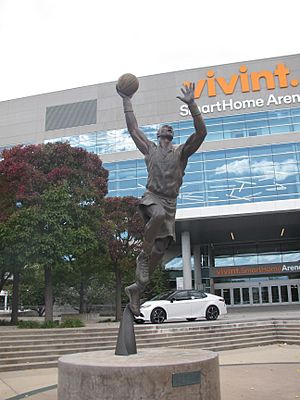
Malone is seen as one of the best power forwards in NBA history. He was known as "the Mailman" because he always delivered consistent performances. He won two regular-season MVP Awards. He was named to the NBA First Team eleven times. He was also selected to the NBA All-Defensive First Team three times. In 2022, The Athletic ranked him as the 16th greatest player ever. This was to celebrate the NBA's 75th Anniversary.
Malone wore number 32 for the Utah Jazz. He wore number 11 for the Los Angeles Lakers. Number 32 was retired by the Lakers for Magic Johnson. Malone declined Johnson's offer to unretire it for him. Malone also wore number 11 for the Dream Team. This was because players had to wear numbers 4 to 15 under FIBA rules.
Malone played in 193 playoff games without winning an NBA championship. This is the most in playoff history.
NBA Career Statistics
| Legend | |||||
|---|---|---|---|---|---|
| GP | Games played | GS | Games started | MPG | Minutes per game |
| FG% | Field goal percentage | 3P% | 3-point field goal percentage | FT% | Free throw percentage |
| RPG | Rebounds per game | APG | Assists per game | SPG | Steals per game |
| BPG | Blocks per game | PPG | Points per game | Bold | Career high |
Regular Season
| Year | Team | GP | GS | MPG | FG% | 3P% | FT% | RPG | APG | SPG | BPG | PPG |
|---|---|---|---|---|---|---|---|---|---|---|---|---|
| 1985–86 | Utah | 81 | 76 | 30.6 | .496 | .000 | .481 | 8.9 | 2.9 | 1.3 | 0.5 | 14.9 |
| 1986–87 | Utah | 82* | 82* | 34.8 | .512 | .000 | .598 | 10.4 | 1.9 | 1.3 | 0.7 | 21.7 |
| 1987–88 | Utah | 82 | 82* | 39.0 | .520 | .000 | .700 | 12.0 | 2.4 | 1.4 | 0.6 | 27.7 |
| 1988–89 | Utah | 80 | 80 | 39.1 | .519 | .313 | .766 | 10.7 | 2.7 | 1.8 | 0.9 | 29.1 |
| 1989–90 | Utah | 82* | 82* | 38.1 | .562 | .372 | .762 | 11.1 | 2.8 | 1.5 | 0.6 | 31.0 |
| 1990–91 | Utah | 82* | 82* | 40.3 | .527 | .286 | .770 | 11.8 | 3.3 | 1.1 | 1.0 | 29.0 |
| 1991–92 | Utah | 81 | 81 | 37.7 | .526 | .176 | .778 | 11.2 | 3.0 | 1.3 | 0.6 | 28.0 |
| 1992–93 | Utah | 82 | 82* | 37.8 | .552 | .200 | .740 | 11.2 | 3.8 | 1.5 | 1.0 | 27.0 |
| 1993–94 | Utah | 82* | 82* | 40.6 | .497 | .250 | .694 | 11.5 | 4.0 | 1.5 | 1.5 | 25.2 |
| 1994–95 | Utah | 82* | 82* | 38.1 | .536 | .268 | .742 | 10.6 | 3.5 | 1.6 | 1.0 | 26.7 |
| 1995–96 | Utah | 82 | 82* | 38.0 | .519 | .400 | .723 | 9.8 | 4.2 | 1.7 | 0.7 | 25.7 |
| 1996–97 | Utah | 82 | 82* | 36.6 | .550 | .000 | .755 | 9.9 | 4.5 | 1.4 | 0.6 | 27.4 |
| 1997–98 | Utah | 81 | 81 | 37.4 | .530 | .333 | .761 | 10.3 | 3.9 | 1.2 | 0.9 | 27.0 |
| 1998–99 | Utah | 49 | 49 | 37.4 | .493 | .000 | .788 | 9.4 | 4.1 | 1.3 | 0.6 | 23.8 |
| 1999–00 | Utah | 82 | 82* | 35.9 | .509 | .250 | .797 | 9.5 | 3.7 | 1.0 | 0.9 | 25.5 |
| 2000–01 | Utah | 81 | 81 | 35.7 | .498 | .400 | .793 | 8.3 | 4.5 | 1.1 | 0.8 | 23.2 |
| 2001–02 | Utah | 80 | 80 | 38.0 | .454 | .360 | .797 | 8.6 | 4.3 | 1.9 | 0.7 | 22.4 |
| 2002–03 | Utah | 81 | 81 | 36.2 | .462 | .214 | .763 | 7.8 | 4.7 | 1.7 | 0.4 | 20.6 |
| 2003–04 | L.A. Lakers | 42 | 42 | 32.7 | .483 | .000 | .747 | 8.7 | 3.9 | 1.2 | 0.5 | 13.2 |
| Career | 1,476 | 1,471 | 37.2 | .516 | .274 | .742 | 10.1 | 3.6 | 1.4 | 0.8 | 25.0 | |
| All-Star | 12 | 8 | 20.3 | .542 | – | .725 | 6.2 | 1.6 | 1.0 | 0.4 | 12.1 | |
Playoffs
| Year | Team | GP | GS | MPG | FG% | 3P% | FT% | RPG | APG | SPG | BPG | PPG |
|---|---|---|---|---|---|---|---|---|---|---|---|---|
| 1986 | Utah | 4 | 4 | 36.0 | .528 | .000 | .423 | 7.5 | 1.0 | 2.0 | .0 | 21.8 |
| 1987 | Utah | 5 | 5 | 40.0 | .420 | .000 | .722 | 9.6 | 1.2 | 2.2 | .8 | 20.0 |
| 1988 | Utah | 11 | 11 | 44.9 | .482 | .000 | .723 | 11.8 | 1.5 | 1.2 | .6 | 29.7 |
| 1989 | Utah | 3 | 3 | 45.3 | .500 | .000 | .813 | 16.3 | 1.3 | 1.0 | .3 | 30.7 |
| 1990 | Utah | 5 | 5 | 40.6 | .438 | .000 | .756 | 10.2 | 2.2 | 2.2 | 1.0 | 25.2 |
| 1991 | Utah | 9 | 9 | 42.6 | .455 | .000 | .846 | 13.3 | 3.2 | 1.0 | 1.2 | 29.7 |
| 1992 | Utah | 16 | 16 | 43.0 | .521 | .000 | .805 | 11.3 | 2.6 | 1.4 | 1.2 | 29.1 |
| 1993 | Utah | 5 | 5 | 43.2 | .454 | .500 | .816 | 10.4 | 2.0 | 1.2 | .4 | 24.0 |
| 1994 | Utah | 16 | 16 | 43.9 | .467 | .000 | .738 | 12.4 | 3.4 | 1.4 | .8 | 27.1 |
| 1995 | Utah | 5 | 5 | 43.2 | .466 | .333 | .692 | 13.2 | 3.8 | 1.4 | .4 | 30.2 |
| 1996 | Utah | 18 | 18 | 40.3 | .469 | .000 | .574 | 10.3 | 4.4 | 1.9 | .6 | 26.5 |
| 1997 | Utah | 20 | 20 | 40.8 | .435 | .500 | .720 | 11.4 | 2.9 | 1.4 | .8 | 26.0 |
| 1998 | Utah | 20 | 20 | 39.8 | .471 | .000 | .788 | 10.9 | 3.4 | 1.1 | 1.0 | 26.3 |
| 1999 | Utah | 11 | 11 | 41.0 | .417 | .000 | .791 | 11.3 | 4.7 | 1.2 | .7 | 21.8 |
| 2000 | Utah | 10 | 10 | 38.6 | .520 | 1.000 | .810 | 8.9 | 3.1 | .7 | .7 | 27.2 |
| 2001 | Utah | 5 | 5 | 39.8 | .405 | .500 | .796 | 8.8 | 3.4 | 1.0 | .8 | 27.6 |
| 2002 | Utah | 4 | 4 | 40.8 | .411 | .000 | .714 | 7.5 | 4.5 | .8 | .8 | 20.0 |
| 2003 | Utah | 5 | 5 | 38.2 | .405 | .000 | .732 | 6.8 | 4.0 | 1.6 | .4 | 19.6 |
| 2004 | L.A. Lakers | 21 | 21 | 38.0 | .450 | .000 | .630 | 8.8 | 3.4 | 1.1 | .1 | 11.5 |
| Career | 193 | 193 | 41.0 | .463 | .162 | .736 | 10.7 | 3.2 | 1.3 | .7 | 24.7 | |
Other Ventures
Businesses and Investments
Malone owns several businesses. These include Teriyaki Grill and Eskamoe's Frozen Custard & More. He also owns Arby's restaurants in Ruston, Louisiana.
He owns car dealerships in Utah and Louisiana. Karl Malone Toyota is in Draper, Utah. Karl Malone Chrysler Dodge Jeep Ram is in Heber City, Utah. He also owns three Jiffy Lube franchises in Utah. He is a part owner of Burger King franchises in Utah and Idaho.
Acting Roles
Malone appeared in the 1994 film Rockwell. He was also a guest on the Static Shock episode "Hoop Squad". He played himself and a superhero called "Pulverizer." Malone also had a cameo in the 2004 comedy film Soul Plane. He appeared in an episode of Brother's Keeper in 1998. He has a recurring role in a skit on Jimmy Kimmel Live! called "All Alone with Karl Malone."
Professional Wrestling
After the 1998 NBA Finals, Malone took part in a professional wrestling match. This was in World Championship Wrestling (WCW). It happened at their Bash at the Beach event in July 1998. Malone, a wrestling fan, teamed with his friend, Diamond Dallas Page. They competed against Dennis Rodman and Hulk Hogan. Malone and DDP lost the match. The event was a big financial success for WCW.
Personal Life
Family Life
Malone married Kay Kinsey on December 24, 1990. She was the winner of the 1988 Miss Idaho USA pageant. They have four children: Kadee (born 1991), Kylee (born 1993), Karl Jr. "K.J." (born 1995), and Karlee (born 1998). K.J. played football at LSU.
Malone has other children from before his marriage. He has twins, Daryl and Cheryl Ford, born in 1981. He also has a son, Demetress Bell, born in 1984. Cheryl Ford went on to play professional basketball. She played for the Detroit Shock in the Women's National Basketball Association. Demetress Bell played as an NFL offensive lineman. He played for the Buffalo Bills, Philadelphia Eagles, and Dallas Cowboys. By 2014, Karl Malone and Demetress Bell had improved their relationship. In 2018, Malone spoke about his older children. He said, "I didn't handle it right; I was wrong."
Beliefs and Interests
Malone has identified as a Baptist. His wife and children are Catholics. He has served on the board of directors for the National Rifle Association of America (NRA). This is a group that supports gun rights.
Malone enjoys hunting and fishing. He owns a summer home near the Kenai River in Alaska. In July 1998, he went on a fishing trip to Alaska with teammates and family.
Malone is known for sometimes referring to himself in the third person. He has appeared in TV commercials for LA Gear sneakers, Starter, and Burger King. A cereal named MVP Flakes was made for him in 2000.
Images for kids
See also
 In Spanish: Karl Malone para niños
In Spanish: Karl Malone para niños


